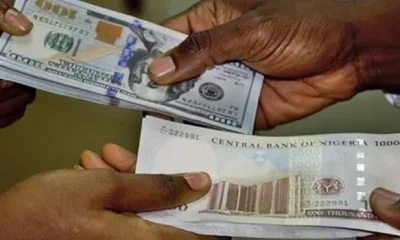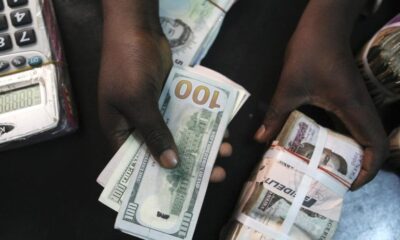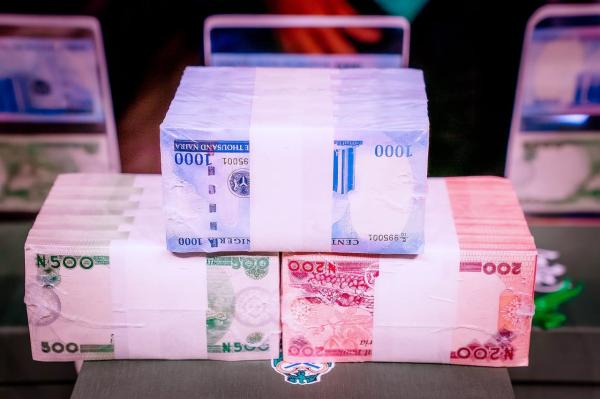Entertainment
Fuji Singers, Pasuma, Osupa, Ayuba Speak On EFCC Ban On Naira Spraying

Nigerian singer, Wasiu Alabi, also known as Pasuma, alongside his colleagues, Saheed Osupa, and Adewale Ayuba, have reacted to the recent move by the Economic and Financial Crimes Commission to enforce the ban on abuse of the Naira.
Recall that controversial crossdresser, Idris Okuneye, popularly known as Bobrisky, was last Friday sentenced to six months imprisonment without the option of a fine for abusing the Naira.
Also, celebrity barman, Pascal Okechukwu, better known as Cubana Chief Priest, was granted bail of N10m, after pleading ‘not guilty’ to a charge of abusing the Naira.
Speaking on the recent move by EFCC in an interview with Punch, Pasuma expressed that the country’s currency had to be respected.
According to him, “I want to believe that there is a difference between spraying a musician money, and mutilating naira notes. Spraying a musician money is an inseparable part of our African culture during celebrations. Meanwhile, abuse or mutilation of currencies has to do with throwing money around and stepping on them, thus reducing their lifespan.
“Right from the onset, I have never been a fan of naira abuse. I don’t like it when people throw money around on my stage. It is a sign of disrespect to the artiste and the currency itself.
“If you watch my stage performances, you will see that I have a box where people put money when they want to appreciate my work. And, that was even before this naira abuse campaign started. I think that is the right and respectful manner to treat the artiste and the Naira.
“So, the war against naira spraying has not affected my performances and earnings as a law-abiding citizen that I am.”
Also speaking, Osupa explained that the new development had not affected his business, stressing that his crew made more money when fans are mandated to put money in a box instead of spraying it.
In his words, “People no longer spray money at my shows. They just drop money in a box that is provided on stage. So, I cannot say it has affected me badly. We still make money the way we made it before. The only difference is that people don’t spray the money again.”
“Most people just use spraying money to show off. Many of them don’t really want to spray that money, they just want to spite some people. Also, there are times that those who spray money don’t really spend much, they just make it look as if they are spraying a lot. However, it is when they put money in the box that we actuually make more money. Some people also make bank transfers.”
On his part, Ayuba stated that the ban on Naira spraying would not affect him because he had always adopted the same strategy of telling fans to put money in the box during his performance.
“The problem with spraying money is the way some people handle the currency by flinging it, throwing it to a crowd, stepping on it, and treating it like trash. That is ridiculous, and I don’t support it. The new enforcement drive by the government won’t affect me, because whenever I am performing, I have a box where people can put the money they want to spray me.
“What the government is say is that people should not abuse our currency; they are not saying that people should not spend money on artistes. Government is only telling citizens to respect our currency, because it is part of our identity as a nation,” he said.
-

 Breaking News3 years ago
Breaking News3 years agoBREAKING: CBN Redesigns Naira Notes
-

 Breaking News2 years ago
Breaking News2 years agoBREAKING: Tinubu Considers Temporary Subsidy On Petrol
-

 Breaking News2 years ago
Breaking News2 years agoJUST IN: Gbajabiamila Dies In UK
-

 News3 years ago
News3 years agoDrama As Church Gives Certificate Of Virginity To Ladies After Testing Them (See Photos)
-

 Crime4 years ago
Crime4 years agoUproar As Student Teacher On Teaching Practice Impregnates 24 Girls, Headmistress, Four Female Teachers
-

 Breaking News10 months ago
Breaking News10 months agoJUST IN : Sacked Osun LG Chairman Killed Few Minutes After Returning To Office
-

 Breaking News2 years ago
Breaking News2 years agoBREAKING: Dangote Speaks As BUA Reduces Price Of Cement
-

 Crime3 years ago
Crime3 years agoJUST IN: Gunmen Storm Osogbo, Kill Man, Daughter Few Hours After His Wife Put To Bed (Photos)









